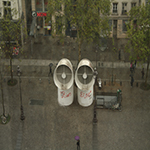Euroacademia Conferences
 Europe Inside-Out: Europe and Europeanness Exposed to Plural Observers (9th Edition) April 24 - 25, 2020
Europe Inside-Out: Europe and Europeanness Exposed to Plural Observers (9th Edition) April 24 - 25, 2020 Identities and Identifications: Politicized Uses of Collective Identities (9th Edition) June 12 - 13, 2020
Identities and Identifications: Politicized Uses of Collective Identities (9th Edition) June 12 - 13, 2020 8th Forum of Critical Studies: Asking Big Questions Again January 24 - 25, 2020
8th Forum of Critical Studies: Asking Big Questions Again January 24 - 25, 2020 Re-Inventing Eastern Europe (7th Edition) December 13 - 14, 2019
Re-Inventing Eastern Europe (7th Edition) December 13 - 14, 2019 The European Union and the Politicization of Europe (8th Edition) October 25 - 26, 2019
The European Union and the Politicization of Europe (8th Edition) October 25 - 26, 2019 Identities and Identifications: Politicized Uses of Collective Identities (8th Edition) June 28 - 29, 2019
Identities and Identifications: Politicized Uses of Collective Identities (8th Edition) June 28 - 29, 2019 The European Union and the Politicization of Europe (7th Edition) January 25 - 26, 2019
The European Union and the Politicization of Europe (7th Edition) January 25 - 26, 2019 7th Forum of Critical Studies: Asking Big Questions Again November 23 - 24, 2018
7th Forum of Critical Studies: Asking Big Questions Again November 23 - 24, 2018 Europe Inside-Out: Europe and Europeanness Exposed to Plural Observers (8th Edition) September 28 - 30, 2018
Europe Inside-Out: Europe and Europeanness Exposed to Plural Observers (8th Edition) September 28 - 30, 2018 Identities and Identifications: Politicized Uses of Collective Identities (7th Edition) June 14 - 15, 2018
Identities and Identifications: Politicized Uses of Collective Identities (7th Edition) June 14 - 15, 2018
History, Memory, and Religion in the Czech Lands
-
-

-
Presentation speakers
- Jakub Havlíček, Department of Sociology and Cultural Anthropology, Faculty of Arts, Palacký University, Olomouc, Czech Republic
- Download presentation
Abstract:
The paper deals with the role of religion in the process of defining Czech national identity. Its theoretical background is based on the combination of K. Dobbelaere’s concept of secularization with the sociopolitical conflict model as defined by P. S. Gorski. The role of religious ideas, practices and institutions is transformed in the process of societal modernization and functional differentiation. New, non-religious worldviews are developed. In the process of mutual interaction of secular worldviews with religion, religious elements become integral part of discourses within the developing sub-systems of politics, education, economics, etc. It leads to the situation of persisting importance of religious ideas at the societal level, where religious phenomena continue to be discussed. The concepts of the Czech national identity incorporate religious elements under the conditions of religious monopoly in the Empire of Austria-Hungary. The anti-clerical or anti-Catholic concepts of national history appear at the societal level, while people tend to embrace the dominant form of religion connected to the state system at the individual level. Individual religious affiliation reveals increasing complexity with the end of religious monopoly, with the creation of the independent Czechoslovakia in 1918 and under the situation of religious pluralism. At the individual level the Roman Catholic Church continues to dominate religious life of the Czechs, nevertheless the declared church membership gradually decreases. Since religious phenomena have become incorporated into secular worldviews, such as into the concepts of national identity, religion persists at the societal level.
-
Related Presentations

Security and Integration Issues in the Relations between the European Union and the Western Balkans
- Marília Bortoluzzi Severo

















